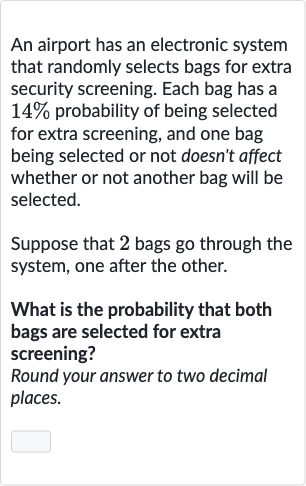AI tutor
Welcome to Bytelearn!
Let’s check out your problem:

An airport has an electronic system that randomly selects bags for extra security screening. Each bag has a probability of being selected for extra screening, and one bag being selected or not doesn't affect whether or not another bag will be selected.Suppose that bags go through the system, one after the other.What is the probability that both bags are selected for extra screening?Round your answer to two decimal places.
Full solution
Q. An airport has an electronic system that randomly selects bags for extra security screening. Each bag has a probability of being selected for extra screening, and one bag being selected or not doesn't affect whether or not another bag will be selected.Suppose that bags go through the system, one after the other.What is the probability that both bags are selected for extra screening?Round your answer to two decimal places.
- Define Event S: Let's denote the event that a bag is selected for extra screening as . We are given that the probability of for any bag is , or . Since the selection of one bag does not affect the selection of another, the events are independent. The probability that both events occur is the product of their individual probabilities.So, the probability that both bags are selected for extra screening is .Now we calculate this probability: .
- Calculate Probability: Performing the multiplication, we get .
- Perform Multiplication: To express the probability as a percentage rounded to two decimal places, we convert to a percentage. This gives us .
More problems from Find probabilities using the addition rule
QuestionGet tutor help
QuestionGet tutor help
QuestionGet tutor help
QuestionGet tutor help
QuestionGet tutor help
QuestionGet tutor help
QuestionGet tutor help
QuestionGet tutor help
QuestionGet tutor help
